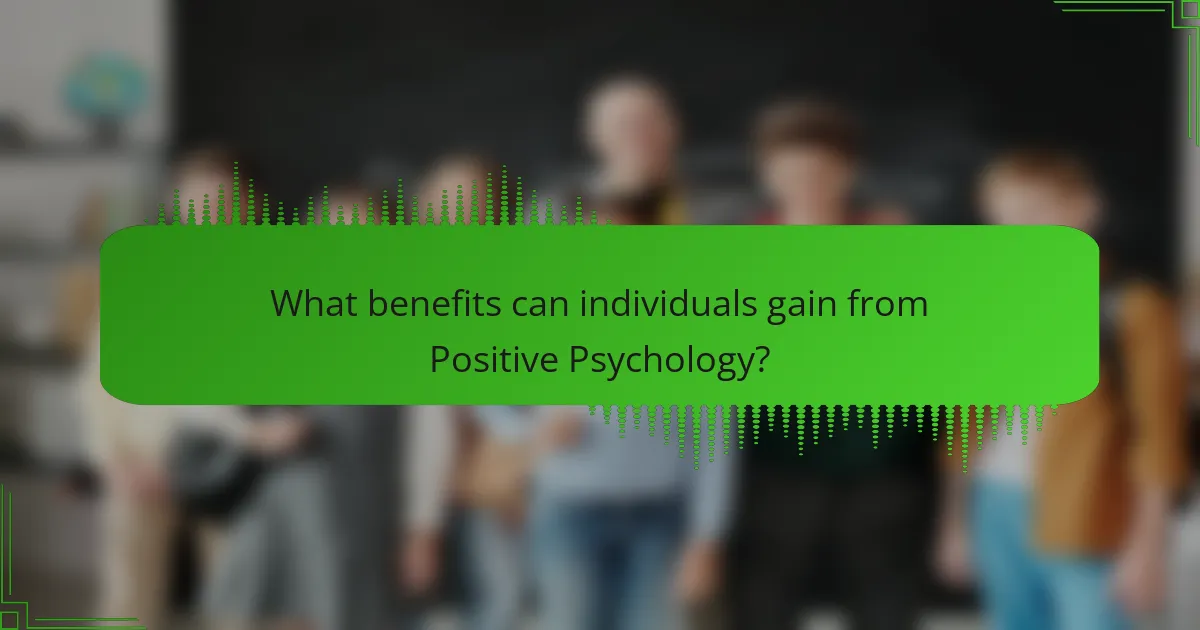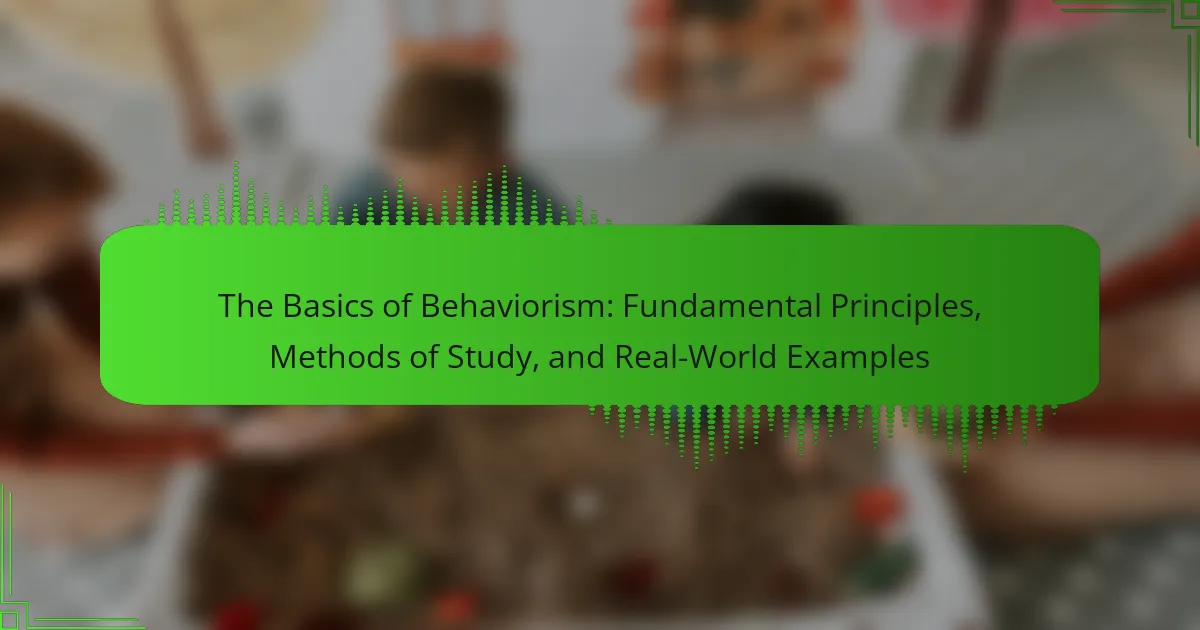Positive psychology is a specialized branch of psychology that examines the positive elements of human experience, including strengths, virtues, and factors that contribute to a fulfilling life. This field, founded by Martin Seligman in the late 1990s, aims to enhance individual well-being and happiness rather than solely focusing on mental illness. Key concepts include the cultivation of positive emotions, resilience, and practices such as gratitude and mindfulness, which have been shown to improve life satisfaction and mental health. The article will explore the core principles of positive psychology, its numerous benefits, and practical applications that individuals can incorporate into their daily lives to foster greater happiness and well-being.

What is Positive Psychology?
Positive psychology is a branch of psychology that focuses on the study of positive aspects of human life. It emphasizes strengths, virtues, and factors that contribute to a fulfilling life. This field aims to enhance well-being and happiness rather than solely addressing mental illness. Developed by Martin Seligman in the late 1990s, positive psychology promotes the idea that individuals can cultivate positive emotions and resilience. Research shows that practices like gratitude and mindfulness can significantly improve life satisfaction. Studies indicate that engaging in positive psychology interventions leads to measurable increases in happiness and decreases in depressive symptoms.
How does Positive Psychology differ from traditional psychology?
Positive psychology focuses on strengths and well-being, while traditional psychology often emphasizes pathology and mental illness. Traditional psychology primarily addresses dysfunction and treatment of psychological disorders. In contrast, positive psychology aims to enhance positive experiences and personal development. It studies factors that contribute to happiness, fulfillment, and resilience. Researchers like Martin Seligman have pioneered this field, demonstrating that fostering positive emotions can improve overall mental health. Positive psychology promotes practices like gratitude and mindfulness, which are less emphasized in traditional approaches. This distinction highlights a shift from merely treating problems to enhancing life quality.
What are the foundational concepts of Positive Psychology?
The foundational concepts of Positive Psychology include well-being, positive emotions, and character strengths. Well-being encompasses life satisfaction and a sense of purpose. Positive emotions contribute to resilience and overall happiness. Character strengths are individual traits that foster positive outcomes. Research by Seligman et al. (2005) identifies these as core components. The focus of Positive Psychology is on enhancing human flourishing. This approach contrasts with traditional psychology, which often emphasizes pathology. Studies show that cultivating these concepts can lead to improved mental health. Positive Psychology aims to promote a fulfilling and meaningful life.
Why is Positive Psychology important in today’s society?
Positive psychology is important in today’s society because it focuses on enhancing well-being and happiness. This field emphasizes strengths and virtues that contribute to a fulfilling life. Research shows that positive psychological interventions can lead to improved mental health outcomes. For instance, a study by Seligman et al. (2005) demonstrated that individuals who practiced gratitude reported higher levels of happiness. Furthermore, positive psychology promotes resilience, helping people cope with stress and adversity. It encourages individuals to cultivate positive emotions, which can lead to better relationships and greater life satisfaction. In a world facing various challenges, positive psychology provides tools for personal growth and community well-being.
What are the core principles of Positive Psychology?
The core principles of Positive Psychology focus on enhancing well-being and happiness. These principles include the study of positive emotions, engagement, relationships, meaning, and accomplishments. Positive emotions refer to feelings that contribute to overall happiness. Engagement involves being deeply involved in activities that bring joy. Relationships emphasize the importance of social connections for well-being. Meaning highlights the significance of having a purpose in life. Accomplishments focus on achieving goals and personal growth. Research by Seligman (2011) outlines these principles in his framework known as PERMA, demonstrating their impact on mental health and life satisfaction.
How do the principles of Positive Psychology promote well-being?
The principles of Positive Psychology promote well-being by focusing on enhancing positive emotions, strengths, and life satisfaction. This psychological approach emphasizes the cultivation of positive experiences and personal strengths. Research indicates that practices such as gratitude, mindfulness, and resilience can significantly improve mental health. For instance, a study by Seligman et al. (2005) found that individuals who engaged in positive interventions reported increased happiness and decreased depressive symptoms. These principles encourage individuals to pursue meaningful goals and foster social connections, which are essential for overall well-being.
What role does resilience play in Positive Psychology?
Resilience is a key component of Positive Psychology. It refers to the ability to bounce back from adversity and maintain mental well-being. In Positive Psychology, resilience enhances individual strengths and promotes coping strategies. Research shows that resilient individuals experience lower levels of stress and better emotional regulation. Studies indicate that resilience is linked to greater life satisfaction and overall happiness. For example, a study by Tugade and Fredrickson (2004) found that resilience contributes to positive emotions during challenging situations. This highlights the importance of resilience in fostering psychological health and well-being within Positive Psychology frameworks.

What benefits can individuals gain from Positive Psychology?
Individuals can gain numerous benefits from Positive Psychology. This field focuses on enhancing well-being and happiness. Positive Psychology encourages personal strengths and virtues. It promotes resilience in the face of adversity. Research shows that practicing gratitude can improve mental health. Studies indicate that positive emotions can lead to better physical health. Engaging in meaningful activities increases life satisfaction. Positive Psychology also fosters stronger social connections. These benefits contribute to an overall improved quality of life.
How does Positive Psychology enhance mental health?
Positive psychology enhances mental health by focusing on strengths and well-being rather than just treating mental illness. It promotes positive emotions, engagement, and meaning in life. Research shows that practicing gratitude can lead to improved mood and life satisfaction. Studies indicate that individuals who engage in positive psychology interventions report lower levels of anxiety and depression. Additionally, fostering social connections is a key component of positive psychology, which supports emotional resilience. The application of mindfulness techniques also contributes to better mental health outcomes. Overall, positive psychology provides tools that empower individuals to cultivate a fulfilling and balanced life.
What specific mental health disorders can Positive Psychology address?
Positive Psychology can address various mental health disorders, including depression, anxiety, and stress-related disorders. Research indicates that Positive Psychology interventions can enhance well-being and reduce symptoms of these disorders. For instance, a study published in the Journal of Consulting and Clinical Psychology found that Positive Psychology practices significantly improved mood and reduced anxiety levels. Additionally, Positive Psychology techniques, such as gratitude exercises and strengths identification, have shown effectiveness in alleviating depressive symptoms. Overall, Positive Psychology provides valuable tools for managing and improving mental health outcomes.
How does Positive Psychology contribute to emotional intelligence?
Positive psychology enhances emotional intelligence by fostering self-awareness and emotional regulation. It emphasizes the understanding of one’s emotions and the ability to manage them effectively. This approach encourages individuals to cultivate positive emotions, which can lead to better interpersonal relationships. Research shows that individuals with higher emotional intelligence tend to have greater life satisfaction and well-being. Positive psychology also promotes resilience, which is crucial for navigating emotional challenges. By focusing on strengths and virtues, individuals can improve their emotional responses. This development ultimately contributes to a more profound emotional intelligence, enabling better empathy and social skills.
What impact does Positive Psychology have on relationships?
Positive Psychology enhances relationships by promoting positive emotions and strengths. This approach encourages individuals to focus on gratitude, empathy, and resilience. Research indicates that expressing gratitude in relationships leads to increased satisfaction and connection. A study by Emmons and McCullough (2003) found that individuals who regularly practiced gratitude reported higher levels of relationship quality. Positive Psychology also fosters open communication and conflict resolution skills. These skills contribute to healthier interactions and stronger bonds. Overall, the principles of Positive Psychology create a foundation for thriving relationships.
How can Positive Psychology improve communication skills?
Positive Psychology can improve communication skills by enhancing emotional intelligence and fostering positive relationships. Emotional intelligence allows individuals to understand and manage their own emotions. This understanding leads to better empathy towards others. Empathy is crucial in effective communication. Positive Psychology also encourages open-mindedness and active listening. These traits create a supportive communication environment. Research shows that individuals with high emotional intelligence communicate more effectively. A study published in the Journal of Positive Psychology found a strong correlation between positive emotions and improved communication. This evidence supports the claim that Positive Psychology enhances communication skills.
What are the effects of Positive Psychology on team dynamics?
Positive psychology enhances team dynamics by fostering collaboration and improving communication. It encourages a positive work environment where team members feel valued. This leads to increased motivation and higher job satisfaction. Research indicates that teams practicing positive psychology show improved performance metrics. A study by Cameron et al. (2011) found that positive interventions in teams resulted in a 30% increase in productivity. Additionally, positive psychology promotes resilience among team members. Resilient teams can better navigate challenges and conflicts. Overall, positive psychology creates a supportive atmosphere that strengthens team cohesion.

How can Positive Psychology be applied in daily life?
Positive psychology can be applied in daily life through practices that enhance well-being. Individuals can start by practicing gratitude. Keeping a gratitude journal has been shown to increase happiness levels. Engaging in acts of kindness can also boost one’s mood. Research indicates that helping others contributes to personal satisfaction. Mindfulness meditation is another effective tool. Studies show that mindfulness reduces stress and improves emotional regulation. Setting achievable goals helps to foster a sense of purpose. Achieving small goals can lead to increased motivation and happiness. Additionally, fostering positive relationships is crucial. Strong social connections are linked to improved mental health.
What practical strategies can individuals use to incorporate Positive Psychology?
Individuals can incorporate Positive Psychology through several practical strategies. Practicing gratitude daily enhances well-being. Keeping a gratitude journal can help individuals focus on positive experiences. Engaging in regular physical activity boosts mood and reduces stress. Exercise releases endorphins, which are natural mood lifters. Building strong social connections fosters a sense of belonging. Spending time with loved ones can improve happiness levels. Mindfulness meditation promotes present-moment awareness and reduces anxiety. Studies show that mindfulness can lead to increased life satisfaction. Setting and pursuing meaningful goals provides a sense of purpose. Research indicates that goal-setting is linked to higher motivation and achievement. Volunteering or helping others enhances feelings of fulfillment. Altruistic behaviors are associated with increased happiness. Lastly, practicing self-compassion allows individuals to treat themselves kindly during failures. Self-compassion is linked to greater emotional resilience.
How can gratitude practices enhance personal well-being?
Gratitude practices enhance personal well-being by fostering positive emotions and improving mental health. Engaging in gratitude can increase levels of happiness and life satisfaction. Research indicates that individuals who regularly express gratitude experience lower levels of depression and anxiety. A study published in the Journal of Personality and Social Psychology found that participants who kept gratitude journals reported higher well-being. Gratitude practices can also strengthen relationships and social connections. This is evident as expressing gratitude can lead to greater relationship satisfaction and increased prosocial behavior. Additionally, gratitude can improve physical health by promoting better sleep and boosting the immune system. Overall, gratitude practices serve as a powerful tool for enhancing personal well-being.
What role does mindfulness play in Positive Psychology?
Mindfulness plays a crucial role in Positive Psychology by enhancing well-being and promoting emotional regulation. It encourages individuals to focus on the present moment, reducing stress and anxiety. Research indicates that mindfulness practices can lead to increased life satisfaction and improved mental health. A study by Brown and Ryan (2003) found that higher mindfulness levels correlate with greater positive emotions and lower negative emotions. Mindfulness also fosters resilience, allowing individuals to cope better with challenges. Thus, integrating mindfulness into Positive Psychology practices can significantly boost overall happiness and mental wellness.
What are some common challenges when applying Positive Psychology?
Common challenges when applying Positive Psychology include resistance to change, misinterpretation of concepts, and cultural differences. Individuals often resist adopting new mindsets or practices. Misinterpretation can lead to superficial applications, neglecting deeper psychological processes. Cultural differences may impact the relevance of positive psychology interventions. Additionally, measuring subjective well-being poses difficulties. Critics argue that positive psychology can overlook negative emotions. Balancing positivity with realism is essential for effective application. These challenges require careful consideration and adaptation in practice.
How can individuals overcome obstacles to implementing Positive Psychology practices?
Individuals can overcome obstacles to implementing Positive Psychology practices by setting clear, achievable goals. Defining specific objectives helps focus efforts and measure progress. Building a supportive environment is essential; engaging with like-minded individuals fosters motivation. Regularly practicing gratitude can shift perspectives and enhance well-being. Utilizing resources such as books and workshops provides valuable insights and techniques. Research indicates that consistent practice of Positive Psychology improves resilience and life satisfaction. A study published in the Journal of Happiness Studies found that individuals who actively engage in Positive Psychology report higher levels of happiness and lower levels of stress.
What resources are available for further exploration of Positive Psychology?
Key resources for further exploration of Positive Psychology include academic journals, books, and online courses. The Journal of Positive Psychology publishes peer-reviewed research on the subject. Books such as “Flourish” by Martin Seligman provide foundational insights. Online platforms like Coursera and edX offer courses on Positive Psychology taught by experts. Additionally, the Positive Psychology Center at the University of Pennsylvania provides valuable research and resources. These resources support comprehensive understanding and application of Positive Psychology principles.
What are the best practices for integrating Positive Psychology into everyday routines?
Integrating Positive Psychology into everyday routines involves specific, actionable practices. Start each day with gratitude by listing three things you appreciate. This practice enhances overall well-being and fosters a positive mindset. Engage in mindfulness exercises, such as meditation or deep breathing, to increase present-moment awareness. Research indicates that mindfulness reduces stress and improves emotional regulation. Incorporate acts of kindness into daily life, like complimenting a colleague or helping a neighbor. Studies show that such acts boost happiness for both the giver and receiver. Set achievable goals that align with personal values to create a sense of purpose. Goal-setting is linked to increased motivation and satisfaction. Finally, cultivate social connections by spending quality time with friends and family, which is associated with improved mental health. These best practices collectively enhance emotional resilience and life satisfaction.
Positive psychology is a branch of psychology focused on the study of positive aspects of human life, emphasizing strengths, virtues, and well-being. This article explores the core principles of positive psychology, including well-being, positive emotions, and resilience, while highlighting its importance in enhancing mental health and personal development. It also discusses practical applications, such as gratitude practices and mindfulness, that individuals can incorporate into their daily lives to improve overall happiness and life satisfaction. Additionally, the article addresses common challenges in applying positive psychology and offers resources for further exploration.



